 | « Back to article | Print this article |
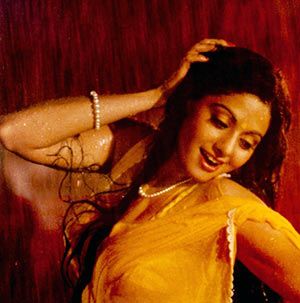
In our special series revisiting great Hindi film classics, Sukanya Verma looks back at Rishi Kapoor-Sridevi-Vinod Khanna starrer Chandni (1989).
Some dreams are so scenic and snug, we want to keep our eyes shut and live inside them for as long as possible. Yash Chopra allowed us to experience such reverie with our eyes open.
A reality veiled in fantasy, poetry and song enhanced by the celebrated filmmaker's enthusiastic eye for nature and sophisticated idea of beauty is what rendered his cinema its exquisite identity and fashioned a school of thought for silver screen romance.
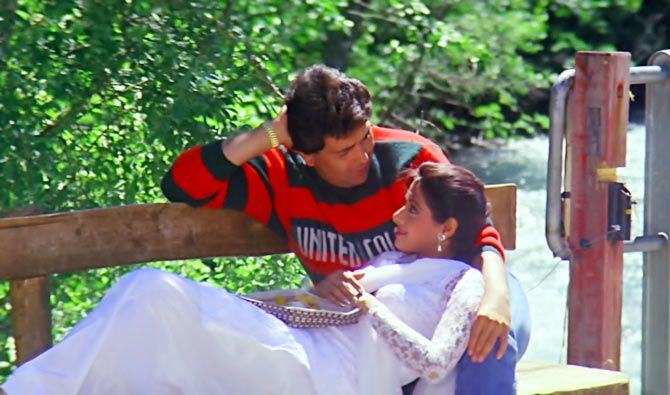
Chandni is an exuberant expression of his elegant vision and starry-eyed beliefs. And like all good things, the 1989 superhit came from Chopra's willingness to take a risk and go against the tide.
Before Chandni, his last few films (Kala Patthar, Silsila, Mashaal, Faasle) hadn't done well at the box office and the formula-treading multistarrer that Chopra was working on (Vijay) wasn't providing any creative satisfaction.
Sick of the monotony of 1980s action-packed era, the director decided to craft a love story around an irresistible beauty and her romantic aspirations.
It's a straightforward plot. Delhi boy Rohit (Rishi Kapoor) falls for Chandni (Sridevi) the minute he lays eyes on her at her cousin's (Renu Arya, she played Salman Khan's love interest in his first film Biwi Ho To Aisi) wedding sangeet.
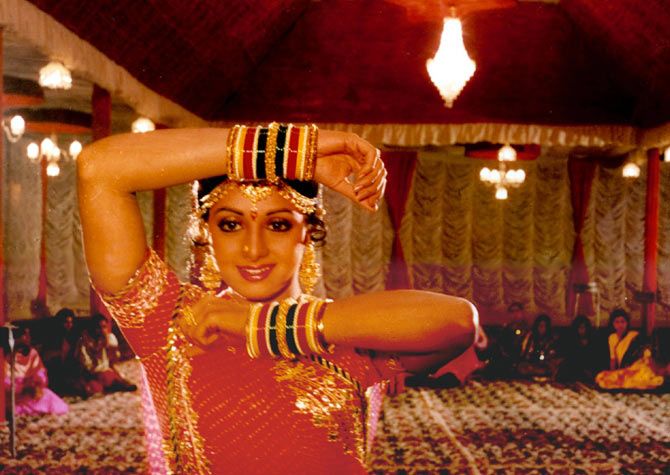
He is not the only one.
It's impossible to take your eyes off Sridevi as she nimbly moves to Saroj Khan's animated steps in Mere Haathon Mein Nau Nau Chooriyan Hain, a gig that would go on to become a regular fixture at big fat Indian shaadis for years to come. It certainly left a huge impression on a young director named Sooraj R Barjatya whose debut Maine Pyar Kiya released a couple of months after Chandni. The idea manifested in the festivities of Hum Aapke Hain Koun..!
Nonetheless, a lighter-flicking stranger professing love to a girl he's just met in the middle of a blackout sounds terribly contrived.
But Chopra picked his actors with care. He knew he could rely on Rishi Kapoor's pizzazz to assure he's just the sort of Prince Charming, Chandni was hoping all her life to bump into.
Convinced no other hero holds such mastery in the genre, Chopra dropped Rekha -- his original choice and the breathtaking Chandni (namesakes include Daag's Raakhee and Faasle's Farah) of his hyped Silsila -- for rising star Sridevi as he thought the latter would make for a far more attractive onscreen pair with Kapoor. They'd previously scored a hit in Harmesh Malhotra's supernatural snake flick, Nagina.
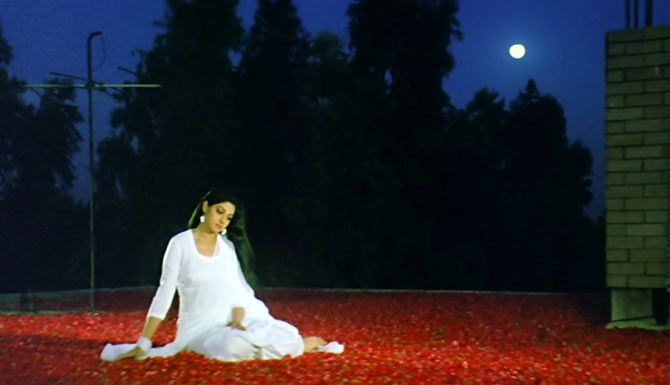
A good deal of Chandni is pure confection -- an affectionate portrayal of two people under the sway of undeniable chemistry, wasting no time in yielding to their impulses against the backdrop of a cosy family wedding. Having declared their feelings to all of Delhi and its eternal landmarks, the duo quickly exchange rings and fantasise about their picturesque honeymoon in, where else, Switzerland.
If ever there was an award for Most Fun Make-Believe Holiday, Chandni wins hands down.
But it's not merely the splendour of the visuals that follow but the excitement of two lovers revelling in the divine pre-matrimony phase, an unapologetic disregard for practicality, a playful dynamic in discovering the truth about Cognac or 'Ghantewale Ki Barfi' and a wholehearted appreciation for grand, giddy gestures that lends Chopra's brand of courtship and dream sequences its endless appeal.
And in case of this National-Award winner, a reason for conflict, Rohit's reckless display of affection lands him in a wheelchair.
His stuck-up affluent family, with the sole exception of the warm but weak-willed brother-in-law (Anupam Kher in a cameo), now resent his bourgeois bride-to-be even more.
In their contrast, Chandni's folks are purely ornamental and show no understanding of or sympathy for their daughter's feelings.
As in the case of Deborah Kerr (An Affair to Remember) or Rajendra Kumar in (Arzoo), fear of pity compels disabled protagonists to distance themselves from their sweethearts. Rohit observes this tradition. The walls of his room, a site for a couple of Chandni's most dramatic scenes, once bursting with magnificent snapshots (clicked by ace photographer Rakesh Shreshtha) of his ladylove in all her moods now receive her blankly, coldly akin to the man who's about to break her heart.
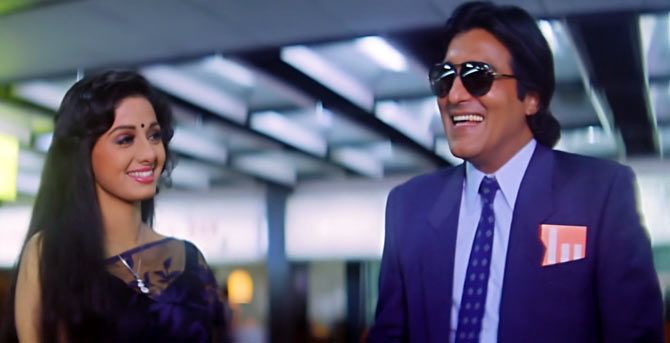
Where most would insert a sad song, Chopra squeezes in the title track, an unintentionally comic one on account of Sridevi's shrill singing skills. Jarring missteps are soon forgotten as she moves on and away to Mumbai, sensibly securing a job in Vinod Khanna's travel agency.
It's refreshing to see a heroine who doesn't mope around and makes a conscious effort to heal, even if it translates to swirling seductively around Bambai ki baarish in her employer's lawns to the soothing blend of Shiv-Hari and Suresh Wadkar.
The men in her life are quite the sentimentalist and reveal a more nostalgic reaction to rains -- Khanna grieves for his deceased girlfriend (Juhi Chawla in a short flashback) in Lagi Aaj Sawaan Ki whereas Kapoor yearns for the good old days when he could shake a leg in tandem with his hotstepper beloved in Parbat Se Kaali Ghata.
No wonder the Sri-smitten duo instantly take to each other in Swiss surroundings and bond over homesickness in Tu Mujhe Suna Main Tujhe Sunao Apni Prem Kahani.
Based on a story by writer Kamna Chandra (mother of film critic Anupama Chopra, author Vikram Chandra and filmmaker Tanuja Chandra), the original premise involved a child and border-lined on 'morbidity' but Chopra wasn't pleased and reworked Chandni into a love triangle.
Unwilling to pander to distributor expectations, he also did away with a fight scene to mark Khanna's entry to cash in his 'action star' draw.
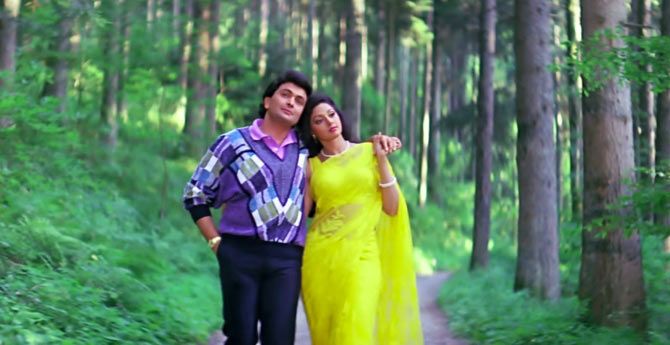
Ultimately, his understated but polished approach to Sri's styling, Khanna's versatility and Kapoor's calibre not only subverted stereotypes but also created a new standard in glamour.
Chopra was nothing if not an aesthete. His favourite elements -- white, rain, Alps, weddings, poetry, red roses, chiffon, melody and tastefully-done interiors of sprawling homes -- come alive in cinematographer Manmohan Singh's sparkling frames flawlessly capturing every tiny detail of his luminous leading lady's spunk under a soft, demure disposition.
Under the combined artistry of designers Bhanu Athaiya, Leena Daru and Neeta Lulla, her clothes, especially the pristine white salwar kameezes with resham embroidery and self-embossed saris, became a rage among the fashion-conscious.
Conspicuously enough, Chandni only wears salwars in the first half while dating Rohit and drapes herself in dainty saris following her bitter split and shift to Mumbai.
Besides costumes and dance, Sridevi is perfection in the scene when a recuperated Rohit shows up at her door in Mumbai.
As I mentioned in my feature on favourite scenes from Yash Chopra movies, 'It's a tricky setting -- previously restricted to wheelchair Rishi Kapoor ended things on a rather nasty note with Sridevi, forcing her to move to Mumbai from Delhi and reluctantly agree to Vinod Khanna's proposal. Oblivious to all these developments, a now perfectly fit and walking Rishi heads to surprise Sri and win her back into his life. True to his character's nature, he's charm personified and apologetic too. It's like they never broke up; the chemistry is fantastic. But it's that combination of astonishment, gladness and hurt on his visibly restrained (and so GORGEOUS) object of affection that speaks volumes about this scene.'
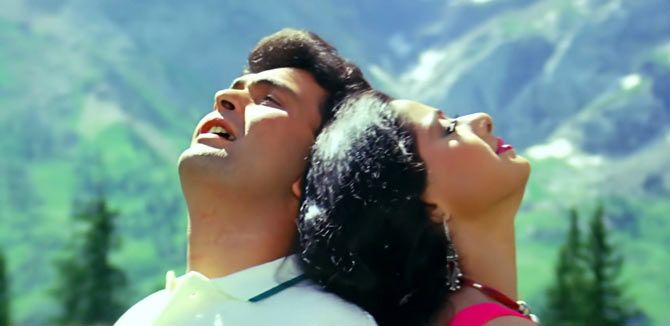
Even though the film's chief focus is on Chandni, it illuminates in the presence of Rishi Kapoor. It's easy to dismiss him as yet another version of the rich, handsome romantic with a fabulous sweater collection but he seamlessly conveys passion, defiance, gloom and regret.
Gestures where Chandni kneels and rests her head on his paralysed feet during the Aa Meri Jaan song whereas he strongly objects indicate revulsion for the patriarchal mind-set.
Also, when his parents disapprove of his choice of a life partner, he firmly tells them off saying he's not seeking permission but will appreciate if they gave their blessings yet won't change his mind if they don't.
The Chandni effect gave a major boost to the music industry but its influence on the 90s batch of filmmakers is undeniable:
Salman Khan gate-crashing into a ladies-only function in Barjatya's Hum Aapke Hain Koun..! like Kapoor in Chandni.
Salman sneaking close to Aishwarya Rai while Zohra Sehgal talks about her newly wedded life in Sanjay Leela Bhansali's Hum Dil De Chuke Sanam similar to Kapoor and Sridevi's flirting session against Achla Sachdev's wedding night anecdote.
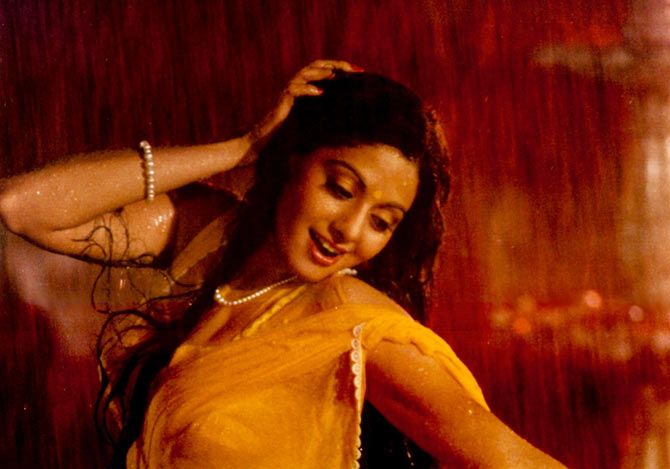
Kajol and Shah Rukh Khan's sad, speaking glances right before she's set to wed Salman Khan in Karan Johar's Kuch Kuch Hota Hai's climax brings back memories of Sridevi and Kapoor's long faces even as the actual groom Vinod Khanna looks on worriedly.
In Chopra's own Dil To Pagal Hai where Akshay Kumar proposes to Madhuri Dixit at the airport and she accepts it owing to her closeness to his mom Farida Jalal the same way Sri is left gobsmacked by VK's pre-boarding proposition and his mother Waheeda Rehman's fondness for her.
Not to mention Sridevi's expressive tandav to an instrumental theme -- noted painter M F Husain loved it so much, he watched Chandni 15 times -- inspired Chopra to design dance-theme segments conveying his characters private most emotions.
Like Lamhe's feverish Moments of Rage, Juhi Chawla's teasing turn to the tune of Obsession in Darr or Madhuri Dixit and Karisma Kapoor's energetic jugalbandi around Dil To Pagal Hai's Dance of Envy.
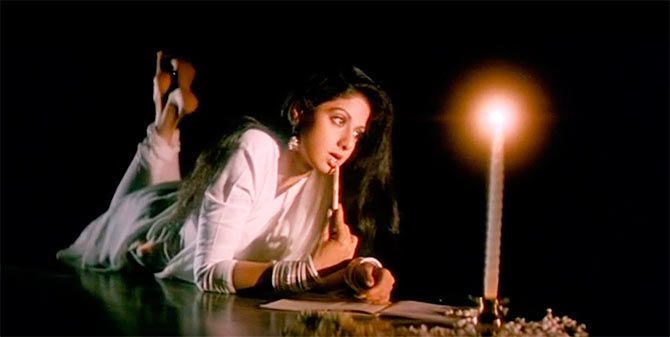
More than 25 years have passed but Chandni retains much of its dazzle.
Those salwars are no longer trendy, Bollywood has moved from Cognac to Vodka and the background theme of Chandni has developed into a beautiful song (Kabhi Main Kahoon) of Lamhe. But the thrill of discovering someone special or the joy of dancing in the rain, when witnessed through the eyes of Hindi cinema's most romantic filmmaker, transcends movie to magic.